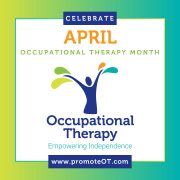Occupational Therapists work every day to help others live their life to the fullest.
When a person is affected by illness, accident, disability, or a mental health condition, occupational therapists help individuals stay active and live well despite limitations. With the help of Occupational Therapists, people can live more independent and productive lives.
Benefits of Occupational Therapy
Nearly one-third of occupational therapists work with older adults. They perform many types of activities, using many types of therapies, with the overriding goal of helping older adults regain or maintain a level of independence that will allow them to live a healthy and productive life.
Daily Life Activities and Modifications
Occupational therapists help people with daily life activities such as bathing, dressing, feeding, homemaking, and more. By developing individualized strategies, chronic pain and arthritis no longer keep patients from participating in activities. Occupational therapists also provide patients with the tools they need to optimize their home environment in order to promote full participation in life activities.
Life Transitions
As we age, we go through numerous transition phases in life, such as retirement, relocation, widowhood, etc. Occupational therapists provide opportunities for patients to recognize the commonalities in their experiences and to gain problem-solving abilities to handle these transitions.
Fall Prevention
People often fall because of bone fragility, slower reflexes, loss of footing, and many other factors. These falls are dangerous as they may result in severe injuries and broken bones. Therapists help inform and instruct patients on staying active, conserving energy, and on techniques and methods of preventing falls.
 Celebrate Occupational Therapy Month — April 2018
Celebrate Occupational Therapy Month — April 2018
Occupational therapists dedicate their lives to helping others achieve their best life by helping them overcome life changes after an injury or illness or due to aging. If you think you or a loved one could benefit from the help of an occupational therapist talk to your doctor today!
Sources: AOTA, www.aota.org
